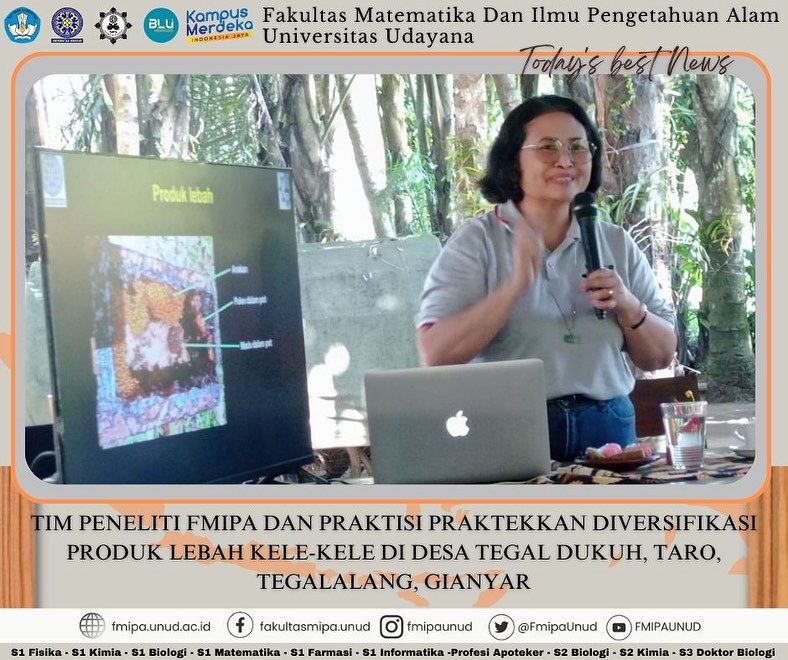FMIPA Research Team and Practitioners practice diversification of Kele-kele Bee Products in Tegal Dukuh Village, Taro, Tegalalang, Gianyar
September 8 2023, Located at Tegal Dukuh Camp, Tegal Dukuh Village, Taro, Tegallalang Gianyar, the Faculty of Mathematics and Natural Sciences, Udayana University held community service regarding the diversification of Kele-kele Bee Products (Tetragonula laeviceps). This service program, which was carried out on the occasion of the 61st anniversary of Udayana University, apart from presenting researchers from the Faculty of Mathematics and Natural Sciences, also presented Kele bee practitioners from Pondok Kele Sari Merta, Mengwi Badung.
Tegal Dukuh Camp, which is the location for this outreach, is managed and owned by Mr. I Wayan Wardika, an alumnus of the Faculty of Tourism, Udayana University. Tegal Dukuh Camp itself is a unique natural parking area where hundreds of giant palm trees are neatly planted to create a shady and rural forest atmosphere. Wardika stated that he was very happy with the arrival of researchers from FMIPA Udayana University, to gain additional knowledge about how to diversify kele bee products, as well as the practice of transferring and multiplying hives from old hives obtained or raised naturally by the owner to new hives. by these researchers can provide great benefits for bee farmers and residents who are interested in Kele bee cultivation.
Counseling on the benefits of honey, pollen, and propolis as ingredients for processed food and health products was given directly by Prof. Dra. Ni Luh Watiniasih, M.Sc., Ph.D., one of the researchers who is also the Dean of the Faculty of Mathematics and Natural Sciences. Watiniasih explained that usually honey produced by bees is only consumed by drinking. In this counseling, it is explained how bee products in the form of honey can also be used as an additional ingredient in tea, bread, or in dishes such as chicken. Apart from that, other bee products such as pollen and propolis can also be used as herbal medicine ingredients. Honey is rubbed on dry lips, drunk as medicine for dry throats, a mixture of honey and pollen is used for masks, and is also consumed for a healthy digestive tract. Propolis, pollen, and honey are known to have anti-inflammatory, anti-bacterial, and viral properties, Propolis is anti-cancer and treats chronic diseases.
Continuing Prof.'s explanation. Watiniasih, practitioner Mr. Nyoman Gde Wismaya from Pondok Kele Sari Merta, Mengwi explained and practiced how to transfer nests from old/natural nests to new nests and how to reproduce nests. In his explanation, Wismaya said that moving the nest and multiplying the nest is very important to maintain the colony so that production can remain sustainable.
The service, which was not only accompanied by men and women from Taro Village who were interested in developing the kele-kele bee (Tetragonula laeviceps), was also attended by 7 MBKM Mandiri intern students from Brawijaya University, Malang. During the 4 hours of counseling from 10.00 – 14.00 WITA, many questions were asked, such as what are the characteristics of the future queen's offspring. It is known that one of the most important things to do in propagating a kele-kele bee nest/colony is to find a new queen. Watiniasih and Wismaya took turns explaining the detailed characteristics of the prospective queen bee in terms of her physiology/physical characteristics. Watiniasih and the team immediately practiced how to move them so that the catfish colony could survive in the new nest. The last thing that is no less important that must be considered in raising kele bees is how to provide a good source of plant food to provide so that the colony remains healthy and can survive for a long time.
At the end of the event, Watiniasih and the researchers invited Taro residents to start cultivating kele-kele honey bees, because the benefits they provide are many. This was agreed by the participants who were very satisfied with the explanations provided by the research team and practitioners. They expressed their interest in cultivating Kele honey bees. Apart from being a healthy food, residents know that kele honey is known to be quite expensive on the market. "So of course it can be a source of additional income for the family," said one participant.
#fmipajaya #fmipaunud #fmipa #unud #udayana


















